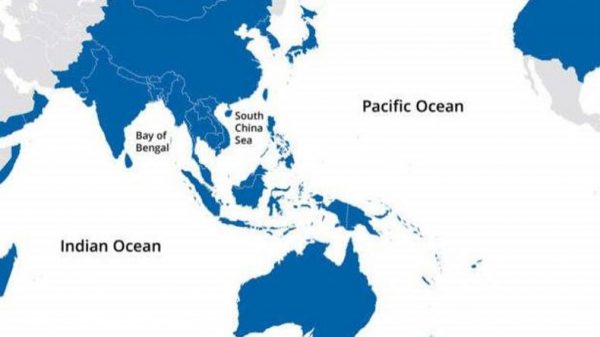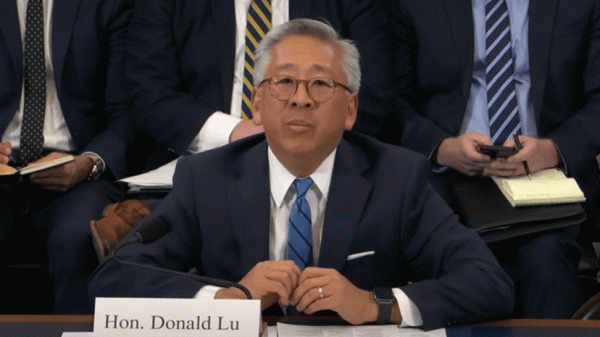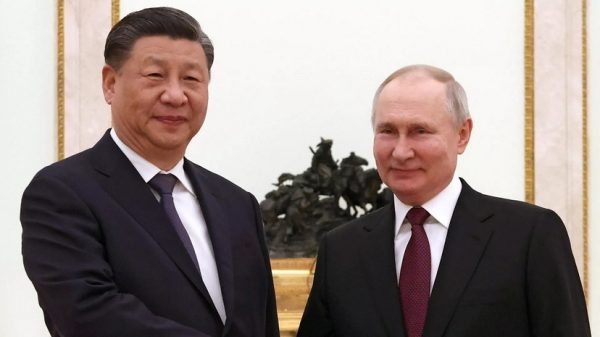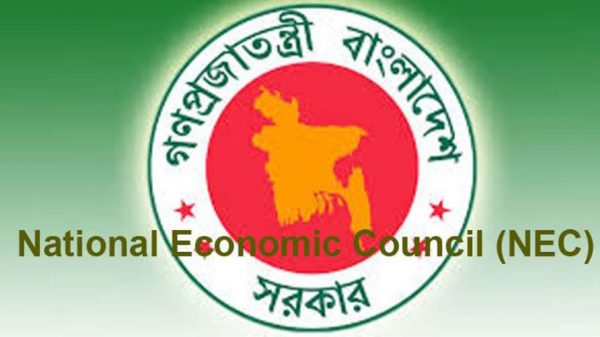Does Bangladesh need an IPS?

by ARM Mutasim Billah:
THE great power rivalries and hegemonic scramble over trade routes have transformed the Indo-Pacific Region into a hotspot of geopolitics. The region has become a new playground for great powers to maintain their status quo or challenge it. The brewing geopolitics is turning the peaceful water into a troubled one. Navigating in this troubled water has become a tough job for small South Asian states. They are finding it difficult to navigate their foreign policy amid such murky politics.
South Asian countries such as Sri Lanka, Nepal, Bhutan and Bangladesh and Southeast Asian countries such as Myanmar, Thailand, Indonesia and Malaysia have found themselves in a state of dilemma amid this rivalry. Varieties of interests, multiple great powers, and geo-economic compulsions are making the environment more difficult for these states. South Asian states did not have mentionable participation in global rivalry. Rather, these states followed a low-key path that would safeguard their national interests and ensure economic development. But the situation has changed a lot during the past few years and the great power rivalries have become a part of their external relations discourse.
Bangladesh may be facing the situation more acutely than many others due to its geostrategic location in the Bay of Bengal, bordering India and Myanmar’s Rakhine state. It also has relatively better military-economic power than the others as well. The country has also achieved remarkable economic success in the past decade and maintains a praiseworthy balance between India and China — two great powers in South Asian politics. But the country is also finding it difficult to maintain neutrality and balance amid newly heated geopolitics.
Against this backdrop, Bangladesh may formulate its own Indo-Pacific Strategy to navigate the situation better. An Indo-Pacific Strategy would provide the country with a guiding policy and a clear objective about what the country should do to safeguard its national interests. The next sections of this article will focus on why Bangladesh should formulate its own Indo-Pacific Strategy, what principles should get priority in it and how the strategy would help Bangladesh amid this ‘tug of war’ among major powers.
Brewing geopolitics
The Indo-Pacific region is home to 4.3 billion people — 6 per cent of the world’s total population. The region also accounts for 40 per cent of the world’s total GDP. The region also has maritime significance. The sea route carries goods worth $1.9 trillion per year. It is also one of the largest destinations for foreign direct investment.
South Asian politics
Since the end of the cold war, South Asia has been relatively peaceful. Great powers’ attention lied somewhere else for the past 20–30 years. As a result, South Asia was also neglected in international politics. Great powers used to see the region through the eye of India. Its politics was primarily seen through Sino-Indian and Indo-Pak rivalries. The discourse about other countries revolved around poverty, natural disasters, and hardship. But during the last decade, South Asian economies, especially Bangladesh’s, achieved remarkable success. The region also attracted a lot of foreign direct investment during that time.
As a result, the discourse has changed a lot within the last few years, shifting from poverty, disaster and hardship to economic success. However, the pandemic and war-induced economic challenges such as inflation and declining foreign exchange reserves have also become a part of the discourse in the current situation.
However, as the superpowers were busy with the Middle East, the geopolitics was a bit easier. South Asian states used to balance or hedge between China and India to ensure their national interests. But the situation changed dramatically in the last decade.
Rise of China and geopolitics
The ‘rise’ of China and consequent events made the politics tougher. The rise of China has been perceived as a challenge to the status quo, the western hegemony. In a South Asian regional setting, the rise also threatened India’s interest in the region.
Moreover, as the Indo-Pacific trade route is one of the major concerns, the Western powers and their Pacific allies also became worried. China’s Belt and Road Initiative (BRI) and its rapid spread worldwide have also increased China’s presence both in this region and beyond.
As a result, the geopolitical attention of almost all major powers quickly shifted to the Indo-Pacific region. The US and its European allies started to increase their engagement in this region, and its Indo-Pacific allies such as India, Japan and Australia also started to join in this engagement. Quickly, they inked agreements and pacts to contain China. The revival of Quadrilateral Security Dialogue (QUAD) between the USA, India, Japan and Australia, the AUKUS pact between the USA, the UK and Australia, and the Indo-Pacific Economic Framework (IPEF) are the major agreements inked by the west and its Indo-Pacific allies to contain Chinese presence in this region. Apart from these initiatives, the European Union and other major powers also clarified their stance on the issues. The USA also increased its presence in the region after Biden’s ascension to the presidency, centring its policy on democracy and human rights. While Western powers seek to contain China through a rules-based, free and open Indo-Pacific, China and its allies oppose such narratives.
China started to increase its presence in the region through BRI projects, development finance, import dependency, and soft loans. As Chinese loans and development finance are relatively easier to avail with no policy conditionalities, countries quickly took massive amounts of ‘Chinese money’ to ensure their economic development in the last decade. As a result, China also found many countries leaning towards it. China also perceived the containment strategies as hostile towards its national interest. It has already labelled QUAD as an ‘Asian NATO’ aimed at China.
Such a confrontational stance among the region’s major powers made geopolitics difficult and increased uncertainty. Perhaps, the current geopolitics of the region is now one of the most complex geopolitical scenarios with uncertainty, and, of course, with tonnes of different predictions!
Bangladesh in between rivalry
Since its independence, Bangladesh has always addressed economic security as its national security and thrived for development. Its role in regional geopolitics is largely defined by Sino-Indian rivalry and the Indo-Pak conflict, where the country maintains a balanced approach between the rival powers and thus ensures its own interests. It has offered a space to navigate its foreign policy. As China has achieved financial capability to provide loans and investments, Bangladesh has taken the opportunity to receive this financial assistance to ensure its national development. Taking Chinese soft loans has also served Bangladesh’s balanced approach. Bangladesh has also emerged as a major destination of foreign direct investment from other major powers and investors such as Korea, Japan, and the USA. The country is now currently graduating from the least developed country to a developing country, which is projected to be finalised by 2026.
However, Bangladesh has always maintained neutrality in its regional politics between India and China. Even though it hedged between the rivals for a while in the 2010s for its own interest, it never leaned towards any of them directly.
So, before the revival of QUAD and the subsequent ascension of Biden, Bangladesh had relatively favourable geopolitical conditions. But as the Indo-Pacific becomes a hotbed for the major powers, the country is now facing more powers to balance. The US interest has also created a new stake in this regard.
The lack of uniformity among QUAD members has also posed new challenges. The QUAD is often understood as a unitary alliance against China. But the QUAD is not a uniform alliance. The ‘unofficial’ nature of the dialogue bears proof of such a claim. Even though India and the USA are sharing the platform with the same objective, their interests in the region are diverse. India itself is projected to be a superpower by 2050. It wants hegemony in this region. While the USA also wants to ensure its strong presence in the region. This is where their interests contradict each other. For instance, India never wants a US military presence in the region. It wants the US to rely on India itself.
Such diverse interests and the nature of South Asian politics are making the scenario more challenging for Bangladesh. While many consider the balancing between QUAD and China, it has to balance between three great powers, India, China and the USA. Since the Ukraine crisis, Russia is also emerging as a power to consider in this region as it is ‘energy giant’ and also has a keen interest in this region. Gradually, Russia’s stake in this geopolitics is also increasing.
Such murky geopolitics is also bringing new challenges for Bangladesh. Bloc politics is becoming more acute and the space for neutrality is shrinking. Multilateralism in the region is also decreasing as polarisation is becoming more visible than ever. Amid all these, Bangladesh needs to ensure its security, cooperation and development.
Why do we need IPS?
Bangladesh is successfully balancing by equalising odd to all parties. But as the country does not have any Indo-pacific strategy; its intentions remain ambiguous to all parties who are mounting pressure to increase their stakes over Bangladesh. For instance, US human rights policy has become a major part of Bangladesh’s national politics for a groundless reason. It is largely the outcome of a diplomatic ploy by the US to sustain pressure on Bangladesh. Again, last year, the Chinese ambassador to Dhaka also became paranoid, thinking that Bangladesh might join QUAD, and ended up warning Bangladesh, which later created a lot of controversy.
To avoid such scenarios and a lack of trust among the great powers, Bangladesh may develop its own Indo-Pacific Strategy based on which it should navigate amid this troubled water.
Apart from the ambiguity, a strategy would also help Bangladesh to maintain its continuity and set a clear vision of what we want to see and do for a desired Indo-Pacific region.
Various actor, various strategies
Major powers who have given their attention to the region already have their own strategy. For instance, the US announced its Indo-Pacific strategy in February, 2022. The US Indo-Pacific Strategy is centred on the western concepts of a free and open Indo-Pacific. The main objective is to contain China. For that, the US strategy relies on modernising its alliances, strengthening its allies in this region, and engaging in economic diplomacy, partnership and development.
Japan is a leading nation in formulating the Indo-Pacific Strategy. Japan introduced the concept of a Free and Open Indo-Pacific that other western powers are using in their strategy. A core element of Japanese strategy is to expand cross-cutting sectors that would allow Japan to displace China’s influence while creating regional security.
The UK also has its own strategy document. In March 2021, the UK integrated review announced that the UK would ‘tilt’ towards the Indo-Pacific for its own security with the ambition to become a European partner in the region. The word ‘tilt’ here means that the UK would increase its engagement in the region to increase capacity building, training facilities, and defence-industrial linkage with its allies in the region.
France also has developed its strategy. The French Indo-Pacific strategy aims to create a multilateral, free and open sea that would benefit all. One interesting observation of French strategy is that it rejects bloc geopolitics because France believes bloc geopolitics would aggravate tensions across the region, particularly in East Asia.
India also has its own strategy in hand. India is following a Kautilyan strategy in the maritime mandala. India’s strategy is focusing on maintaining its strategic autonomy, containing China’s growing presence, and ensuring its hegemony in South Asia. Perhaps India was the first to identify the significance of the region. Raja Mohan’s book ‘Samudra Manthan: Sino-Indian Rivalry in the Indo-Pacific’ grabbed our attention with the idea that the Indian Ocean and the Pacific Ocean should be seen as one sea and one region.
The rival of the aforementioned states, China, also has its own view of the Indo-Pacific Region. It has produced concepts like the Maritime Silk Road in the last decade and it has mobilised its own view through the BRI projects.
At this point, it may seem that only those who are interested in the ‘scramble’ over the region should formulate their strategy, there is much more beyond that. A strategy is not only for advancing quest and laying out plans against rival. It also helps a state to establish a clear vision and reduce misperceptions of rival powers and, thus, helps its national interest and promotes its own world view.
Rationale for Bangladesh
Bangladesh has had no such strategy. The discourse about the state regarding this politics is simple, which side it will be on? Or will it maintain neutrality? So, Bangladesh is caught between two ideas.
Instead, Bangladesh may formulate its own strategy. The strategy should be based on its values and beliefs practised in its foreign policy. A strategy would benefit Bangladesh in many aspects. In diplomacy, it will provide the country with a clear objective and strategic options. Bangladesh will also be benefited in ensuring security and development amid polarisation. The strategy also has a symbolic benefit. It would globalise Bangladesh’s view of the Indo-Pacific. It will also remove any unwanted uncertainty relating to Bangladesh among the rivals.
If Bangladesh formulates its own strategy, the strategy should reflect Bangladesh’s beliefs and values as practised in its foreign policy and guiding principles. Bangladesh, as a small power thriving to emerge as a middle power, has incorporated and practised widely accepted and universal values in its foreign policy.
Multilateralism
Bangladesh should promote multilateralism in the governance of the Indo-Pacific region. Bangladesh usually prioritises multilateralism in its foreign policy. It has active participation in multilateral forums. In the event of any dispute or conflict, the country always resorts to multilateral forums. For instance, Bangladesh went to the International Tribunal for the Law of the Sea to resolve its maritime boundary with Myanmar. In a similar way, when the Rohingya exodus took place in 2017, Bangladesh went to the United Nations to resolve the crisis.
A multilateral decision-making approach to Indo-Pacific security and trade would also be beneficial for Bangladesh as it would give it a space to raise its concerns. Multilateralism is also effective in avoiding any unilateral acts undertaken by any major powers.
Balancing between great powers is a decades-old practice for Bangladesh’s foreign policy. As a small power thriving for economic development, Bangladesh does not prefer any polarisation. Polarisation would only make the strategic environment difficult for the country as it shrinks space for neutrality and balancing becomes a costlier job. Polarisation invokes bloc politics, which also limits the scope for cooperation among the countries. So, Bangladesh should denounce polarisation and bloc politics in its Indo-Pacific strategy.
Security and economic development
Amid heated geopolitics, one of the major challenges is to ensure security and economic development without bringing adverse effects. The strategy must address how to maximise security and development, a prime concern. Bangladesh is already suffering from this dilemma. The Chinese loans and megaprojects have created a perception in the west that Bangladesh is leaning towards China. As a result, Bangladesh is now following a steady approach. But the country needs foreign loans and investment to keep its trajectory upward.
In aspect of security, Bangladesh has several security aspects where it needs external cooperation such as countering terrorism, anti-piracy drive in the sea, cyber security, climate change, and disaster management. But due to polarisation, Bangladesh is finding it difficult to join any initiatives as it may be perceived as ‘leaning’ by the rivals. Joint naval exercises have also fallen under the microscope at this moment.
Focus on regionalism and sub-regional forums
Bangladesh should focus on regionalism in its strategy. Regionalism is a good initiative to avoid the polarisation induced by extra-regional actors. As Bangladesh lies between South Asia and Southeast Asia and is considered as a gateway between the regions, Bangladesh should promote regionalism to create a regionalist feeling among the nations. But the Indo-Pak rivalry, Sino-Indian rivalry and complex political instability in Myanmar pose significant challenges to regionalism in this region.
Bangladesh should also have a special focus on sub-regional forums. These forums often stay out of geopolitics and are based on goodwill and prosperity. Bangladesh is currently serving as the president of the Indian Ocean Rim Association. It is also observing the Colombo Security Conclave — a sub-regional organisation. Apart from these organisations, Bangladesh is also an observer of ASEAN. Sub-regional forums could be good platforms to ensure security and development going beyond great power rivalries and polarisation. However, due to diverse interests among the members and a loose framework, such organisations have a tendency to become ineffective. But the Indian Ocean Rim Association and ASEAN are effective organisations and the Colombo Security Conclave has the potential to become effective only if its members take it seriously.
However, forming such a strategy is not an easy job. It requires experts, professionals and political governments to come together. A lot of time is also needed to formulate a comprehensive strategy. Such a strategy also requires a thorough assessment to align itself with reality. But these are not very hard requirements for Bangladesh. It is still not too late to formulate one. Formulating a strategy would help Bangladesh in dealing with this heated geopolitical situation. It would also display Bangladesh’s worldview and promote Bangladesh’s values and morals to the world. It would also allow the country to escape from being caught between great power rivalries. The strategy would serve as a compass for Bangladesh amid the murky waters and troubled weather of the Indo-Pacific. And lastly, it could also be a ‘think outside the box’ for our practitioners of international relations.
ARM Mutasim Billah is a columnist.























Leave a Reply